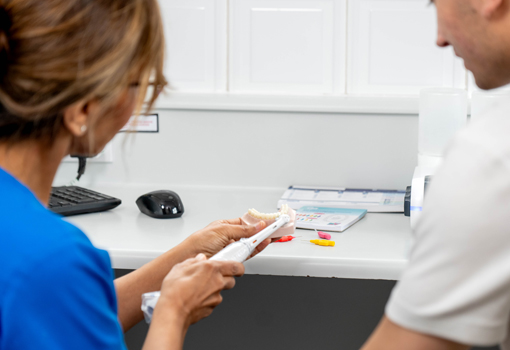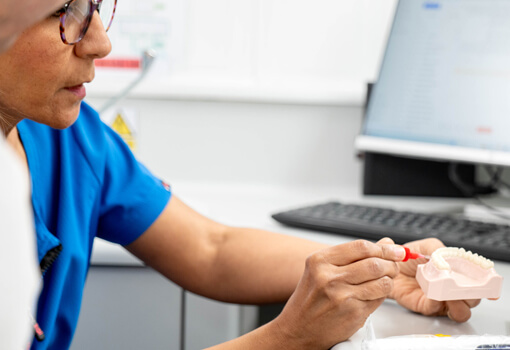Our dental hygienists will professionally clean your teeth. This is called professional mechanical plaque removal.. The process removes soft bacterial plaque and hardened plaque called, calculus, from the surface of your teeth.
Professional dental cleaning will help you maintain a healthy smile, and within the appointment, we will guide you to improving your oral hygiene at home.
Regular hygiene appointments and careful tooth brushing and at home maintenance of your teeth and gums, will help to maintain a healthy smile but reduce your risk of developing gum disease.


Alongside professional cleaning with our hygienists at our practice in Shenfield/Brentwood, we will show you the best way to keep your teeth free of plaque. We always advise to brush and clean between your teeth.
At Talbot Dental, we also offer additional professional cleaning, known as Airflow.
Airflow teeth cleaning uses a combination of water, compressed air, and fine sodium bicarbonate. It is a powerful dental hygiene treatment that cleans and removes plaque, as well as stain removal from your teeth.
The Airflow stain removal at our clinic effectively removes the stains from the teeth’s surface caused by tobacco, caffeine, alcohol, etc. This treatment reveals a brighter and fresher smile and compared to a regular hygiene appointment the difference can be seen immediately.
Gum disease is a common condition where the gums become swollen, sore or infected.
Most adults in the UK have gum disease to some degree and most people experience it at least once. It’s much less common in children.
If you have gum disease, your gums may bleed when you brush your teeth and you may have bad breath. This early stage of gum disease is known as gingivitis.
If gingivitis isn’t treated, a condition called periodontitis can develop. This affects more tissues that support teeth and hold them in place.
If periodontitis isn’t treated, the bone in your jaw may be damaged and small spaces can open up between the gum and teeth. Your teeth can become loose and may eventually fall out.
Visiting the hygienist on a regular basis is an essential part of maintaining good oral health. A qualified dental hygienist can provide a range of treatments to help keep your teeth and gums healthy. By having your plaque and tartar professionally removed, you can avoid the build-up of bacteria in hard-to-reach places which can cause cavities, gum disease and other conditions.
In addition to removing plaque and tartar, your hygienist can also brighten up your smile with scaling and polishing techniques. Plus, they can give you tailored advice on how to look after your teeth properly at home with the right diet and regime for maintaining good oral hygiene. By visiting a hygienist regularly you can ensure that your teeth remain healthy, clean and free from decay or disease.
The frequency of dental hygiene visits is based on individual needs and can vary from every 3 to 12 months. Discussing your unique oral health needs with your dentist or hygienist is important. If you have good oral health, preventive visits may be as infrequent as once a year. However, if you are prone to cavities or gum disease, more frequent cleanings may be recommended.
Your visit to the dental hygienist will usually start with an examination of your teeth and gums, followed by a professional cleaning. During the cleaning, your hygienist will use special tools to remove plaque and tartar that has built up on your teeth. This can help reduce the risk of decay, gum disease, and other oral health issues. After the cleaning, your hygienist may also polish your teeth and provide you with advice on how to keep your mouth healthy at home.
Dental hygienists are trained to perform a range of treatments including scaling and polishing, deep cleaning and root planing, fluoride treatments, and tartar control. They can also provide advice on how to brush and floss correctly, dietary recommendations, and preventive treatments such as sealants or mouthguard.
Good oral hygiene habits are essential to maintaining healthy teeth and gums. Brushing twice a day with fluoride toothpaste, flossing once a day and rinsing with mouthwash are all important parts of an effective dental health routine. Regular brushing removes plaque and food debris that can cause tooth decay and gum disease, while flossing between your teeth helps remove food particles that can get stuck in tight spaces which a toothbrush can’t reach. Rinsing with an antiseptic mouthwash helps reduce bacteria levels in the mouth for fresh breath and also reduces the risk of gum disease.
Interdental brushes are designed to get into the tight spaces between your teeth and help remove plaque and food particles that can accumulate in these areas. Using an interdental brush regularly helps reduce the risk of cavities, gum disease, and bad breath. It’s important to choose the right size for your teeth so it can effectively clean the hard-to-reach areas between your teeth.
| Monday | 9.00 am – 6.00 pm |
| Tuesday | 9.00 am – 6.00 pm |
| Wednesday | Closed |
| Thursday | 2.00 pm – 8.00 pm |
| Friday | 9.00 am – 5.00 pm |
| Saturday | 9.00 am – 2.00 pm |
| Sunday | Closed |